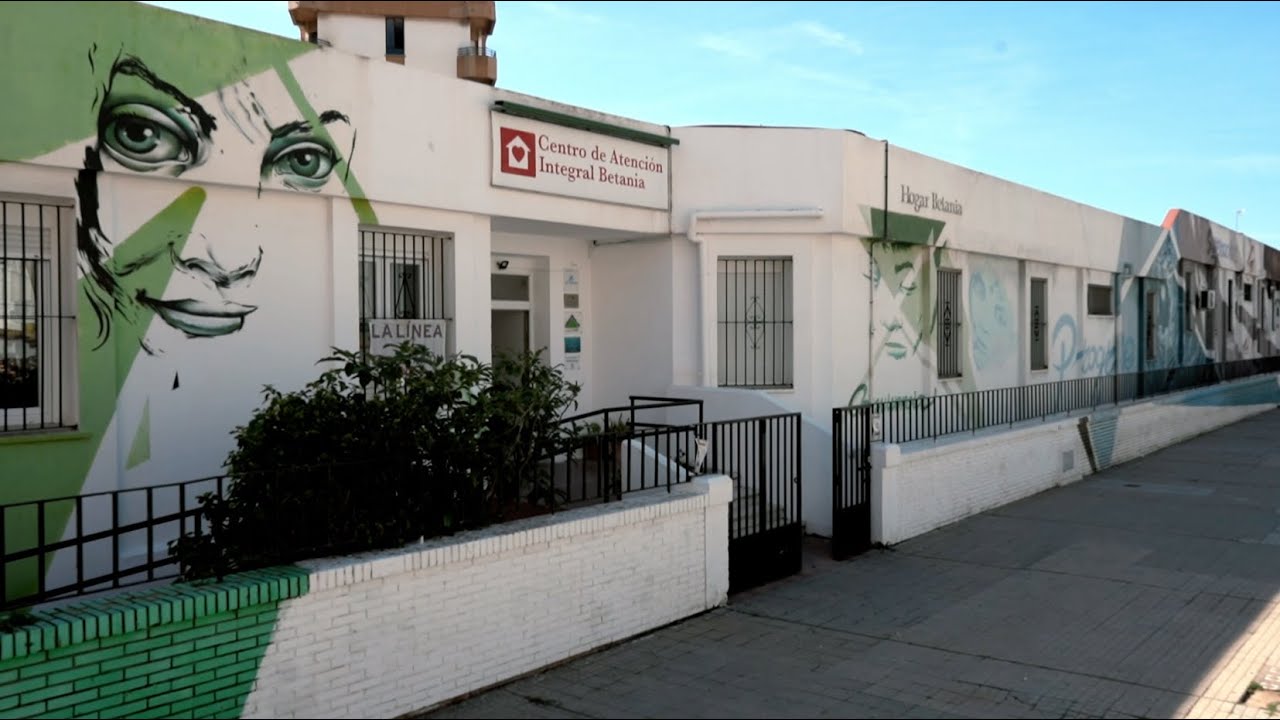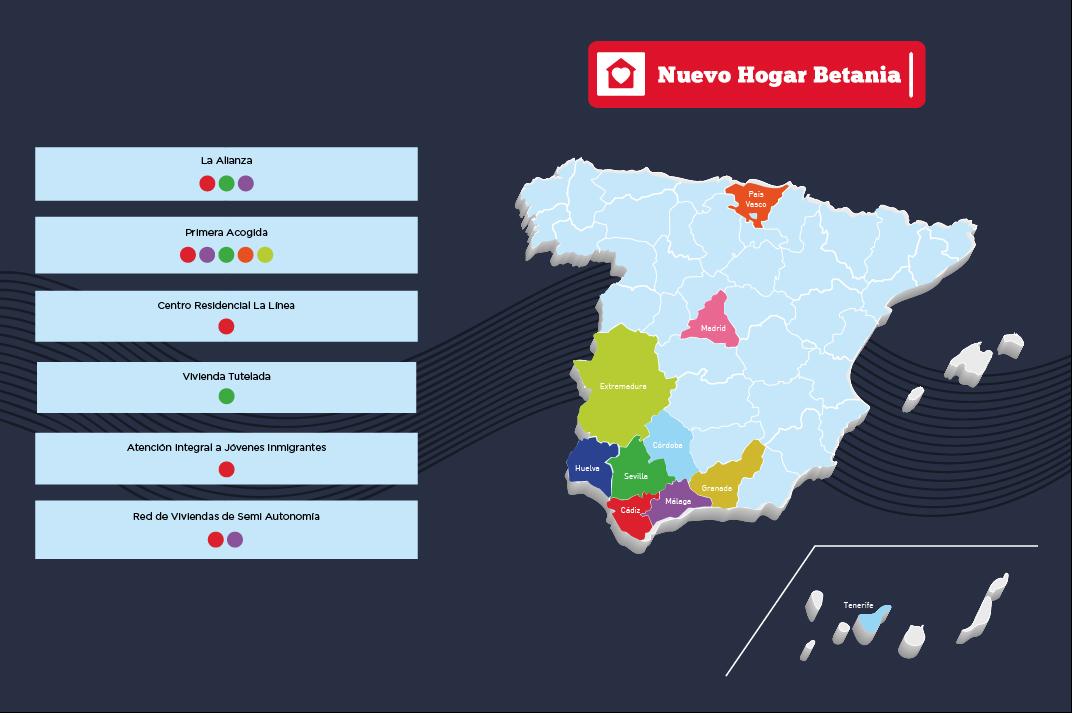
Projects
The Alliance
A multidisciplinary team made up of a psychologist and a social worker, on the street, makes contact with homeless people and establishes a bond of trust with them. Creating this bond of trust is essential as many of the people who find themselves in a street situation reject any kind of contact. This team is specialised in intervention with homeless people and is available for people to contact him/her at all times with an active listening according to the need presented, as well as instant confrontations in which the importance of his/her responsibility is reflected at all times. We carry out routes in which we establish contact and accompaniment in the street of homeless
people who, on occasions, do not access resources due to lack of knowledge or rejection of rules and functioning. Through street work we offer comprehensive advice (health, social, emotional support, etc.).
This service is offered in a general way:
-
Coverage of basic needs: we offer food, hygienic material, etc. This coverage of basic needs is carried out in order to achieve the objective of getting closer to the people, especially those who are more reluctant to establish contacts.
-
Advice and basic assistance, as well as referral to our own resources or those of other organisations according to the needs detected (NGOs, social services, outpatient treatment centre, mental health, etc.).
-
Psycho-education in the streets: In the continuous contacts with the different people, a lot of emphasis will be placed on starting or increasing the motivation for change, opening the doors to the path of insertion.
- Advice and accompaniment in carrying out procedures and formalities.
The street work will be made up of different phases, phases that are changing and recurrent, that can overlap and that include regressions:
- Detection and contact.
- Approaching their places and adapting to their times.
- Respecting their objectives and times.
- Getting to know the situation.
-
Bonding: this stage is the most laborious and longest, as generating a strong bond through which the person can fully trust what is offered is not easy.
-
Support: at this stage is when some contact has been generated and the person feels comfortable with the professional. Skills and psychosocial competences are generated in the person. A lot of work is done on the motivation to change the situation associated with the addiction (if it exists).
First reception
We propose a number of social hostels to accommodate homeless people. They are intended to provide temporary accommodation for situations of social emergency for people who, in the absence of accommodation or the impossibility of staying at home for various reasons, whether economic, social, health or arising from the absence of family members, require access to alternative forms of cohabitation.
The services offered are:
- Coverage of daily dinner and breakfast
- Coverage of shower and personal hygiene products
- Coverage of pharmaceutical material and prescribed medical treatment.
- Coverage of new intimate apparel material and new or recycled clothing..
- Personal accompaniment to general and specific medical appointments.
- Accompaniment to personal formalities (bank, courts, interviews and other formalities).
- Referrals to other resources or our own PSH residential centre, as a bridge to normalisation.
- Personal sessions with each person assisted (interviews with the social worker).
Residential Centre
A reception centre for homeless people and people in social exclusion, covering their basic needs and helping them to return to a normal life.
Activities aimed at covering basic needs:
- Residence service
- Dining room service
- Grooming and personal hygiene
- Laundry and ironing
- Cloackroom service
- Pharmacy and health care service
- Advice, control and supervision of the basic activities of daily living
- Workshops to educate on how to carry out basic activities with regard to the services provided
- Leisure time: Leisure workshops and programmed group outings.
- Accompaniment in the basic activities of daily life.
Psycho-social care:
- Social Care Service: Information, reception, counselling, search for resources…
- Processing of aid and benefits, SEPE, SAE, social security…
- Guidance on legal matters and case monitoring.
- Referrals.
- Contact with other entities and public bodies.
- Case assessment interviews.
- Reception interviews.
- Workshops and group sessions. Develop group sessions where families can share their difficulties and needs.
- Develop group training sessions on different psychosocial aspects of family life at home, responsible consumption, reuse of resources and social commitment, as well as other topics that may be considered of interest.
- Individual sessions with the psychologist.
- Preparation of psychosocial reports.
- Contacts with family members and interventions for the recovery of family relationships or family support in case of break-ups.
- Establishment of agreed personal commitments aimed at improving their integration and quality of life.
- Permanent contact and collaboration with institutions and organisations that work with different groups and in different areas: health, addictions, employment, disabilities, etc.
Sheltered Housing
The residential unit programme for homeless people is an adaptation and improvement of the residential centre for homeless people, which has been operating since 2012. For this implementation we propose a programme with a methodology based on Housing First but adapted to the conditions of being a service in which people who are at risk and/or in a situation of serious social exclusion are attended in a comprehensive manner.
To start the process, a request for help is received from an individual person, through referrals from other entities at regional level, or from the entity’s internal network of resources. The social worker conducts an interview to assess the personal situation, the state of deterioration, the urgency of the need and tries to gather as much information as possible. If the person meets the profile, which is that of a homeless or socially excluded person, aged between 18 and 60, without
active consumption or serious or untreated mental pathology, they are offered the possibility of entry to the residential unit. The rules, rights, duties and procedure are explained to them, and if they decide to enter, the process begins.
They are then welcomed, allocated a place in the accommodation, provided with clean clothes, food and the option to shower and rest. From this moment on, a long, in-depth and personalised intervention by the whole team begins, in which the different needs and deficiencies of each person will be worked on.
They will have the option of accessing educational workshops, employment guidance, psychological sessions, leisure activities and everything depending on the needs that arise at any given time.
Our specially trained team will also be available for emergencies 24 hours a day, 365 days a year. Their intervention is not limited in time and is not conditioned to the fulfilment of an insertion itinerary nor to the accommodation in the housing.
The activities of the project are distributed in the following groups of action:
- Leisure and free time activities
- Activities aimed at covering basic needs
- Psycho-social care
- Educational activities and work orientation
- Activities for the recruitment and participation of volunteers
Integral Attention to Young Immigrants
Project with the following objectives:
- To promote the full social, economic, labour and cultural integration of young migrants in Andalusia.
- To ensure access, in conditions of equality and equity of the foreign population, regardless of their administrative situation, and in the terms indicated by the regulations, to the basic services common to the whole population, such as health, education, employment, housing, socialservices or legal attention.
- Design and promote training programmes aimed at improving the skills of professionals who carry out activities and provide services to the population.
Semi-autonomous Housing Network
Belonging to the EAPN Network (Network for the fight against poverty and social exclusion), their general objectives are:
- To create a space of trust and reference where the HHPs find a safe space during their daytime stay. It will also be an assessment centre to apply for residential places that become vacant. It will have basic maintenance services, emergency laundry, accommodation, distribution of preventive material, basic hygiene, etc.
- Initiate social and labour insertion itineraries in order to stop the deterioration of people in a situation of social and residential exclusion, reducing the damage caused by living on the street, offering them a temporary residential alternative and an approach to the different resources (health, social, educational, employment…) available in the network of care for people in a situation of social exclusion and homelessness.
Street Care for homeless people
The project is aimed at homeless people in various municipalities in the province of Malaga. The profile is that of a man or woman in a street situation, normally of legal age, with the aim of covering the basic needs of daily life in order to prevent the increase of physical and psychosocial deterioration as well as to refer to other specialised resources, either from the entity itself, from other organisations or from the public sector.
A multidisciplinary team made up of a psychologist, a social worker and a sociocultural monitor on the street makes contact with the homeless and establishes a bond of trust with them. Creating this bond of trust is essential as many of the people who find themselves in a street situation reject any kind of contact.
This team is specialised in intervention with homeless people and is available for people to contact him/her at all times with an active listening according to the need presented, as well as instant confrontations in which the importance of their responsibility is reflected at all times. We carry out routes in which we establish contact and accompaniment in the street for homeless people who, on occasions, do not access resources due to lack of knowledge or rejection of the rules and functioning. Through street work, we offer comprehensive advice (health, social, emotional support, etc.). On these routes, the person will be offered assistance to our shelter and residential resource, the decision to attend or not is always left in the hands of the person and we base our decision on informing them. If the step of accessing the day centre is taken directly by the person, the whole process of empowerment from the entrance to the day centre is more easily developed.
Equipo


















